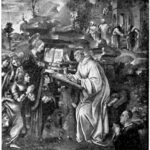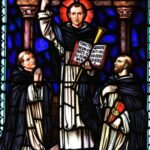
St. Paternus
Saint Paternus
When they lived:
Saint Paternus, also known as Saint Padarn, lived during the 5th and 6th centuries. His exact birth and death dates are not precisely documented, but it is widely believed that he was born around 480 AD and passed away around 550 AD.
Where they lived:
Saint Paternus spent much of his life in the region known as Brittany, which is situated in modern-day France. He is particularly associated with the areas of Vannes and Llandeilo in Brittany and Wales, respectively.
Notable world events during the time of their life:
- Fall of the Western Roman Empire (476 AD): Saint Paternus lived through the decline and fall of the Western Roman Empire, witnessing the transition from Roman dominance to the emergence of various successor kingdoms and power structures across Europe.
- Migration Period (4th-7th centuries): The Migration Period was marked by large-scale movements of various Germanic, Hunnic, and Slavic tribes across Europe. These migrations led to significant cultural and demographic shifts and shaped the political landscape of the continent.
- Life of Saint Patrick (5th century): During the life of Saint Paternus, the well-known Saint Patrick was active in Ireland, spreading Christianity and influencing the religious landscape of the time. Although Saint Paternus did not have direct interactions with Saint Patrick, their parallel efforts contributed to the broader Christianization of Europe.
- Justinian’s Reconquest (6th century): Emperor Justinian I of the Byzantine Empire embarked on a campaign to reclaim lost territories in the Western Mediterranean, including parts of Italy and North Africa. This campaign, known as the Reconquest, had significant geopolitical implications and shaped the Mediterranean world.
- Emergence of Celtic Christianity: The era during which Saint Paternus lived witnessed the development of Celtic Christianity, characterized by its distinct traditions and practices. Celtic monasticism and spirituality had a profound impact on the way Christianity was practiced in regions like Brittany and Wales.
Their patronage:
Saint Paternus is revered as the patron saint of several aspects of life. He is the patron saint of poets, scholars, and musicians, drawing inspiration from his own dedication to learning and spreading the message of Christianity. Additionally, he is recognized as a protector of cattle and livestock, reflecting his connection to rural communities and the agrarian way of life prevalent during his time.
A Life Shaped by Faith and Changing Times:
Saint Paternus’s life story is a testament to the intersection of faith and the dynamic historical events that unfolded during his era. He exemplified the resilience and adaptability required to navigate a period of transition and upheaval. His devotion to Christianity, coupled with his commitment to intellectual pursuits, made him a guiding light for those seeking spiritual solace and enlightenment in a world undergoing significant transformation. As we reflect on his legacy, we are reminded of the enduring power of faith to guide individuals through both tranquil and turbulent times.
Saint Paternus was a 4th century bishop who was known for his dedication to the Christian faith and his strong leadership in the early days of the church. He was born in what is now modern day Cornwall, and at a young age, he was ordained as a priest in the city of Dumnonia.
Early Life and Ordination
Not much is known about Paternus’s early life, but it is believed that he was born in the late 3rd century in the city of Dumnonia. This region, which is now part of modern-day Cornwall, was a bustling center of trade and commerce at the time, and Paternus likely grew up in a wealthy and influential family.
As a young man, Paternus decided to dedicate his life to the service of the church, and he was ordained as a priest in the city of Dumnonia. He quickly gained a reputation for his deep devotion to the Christian faith, and he became known for his powerful preaching and his ability to inspire others to follow in the footsteps of Christ.
Bishop of Dumnonia
In the early 4th century, Paternus was appointed as the bishop of Dumnonia, a position that he held for the rest of his life. As bishop, Paternus worked tirelessly to spread the gospel and to build up the church in his region. He traveled throughout the region, preaching to the people and establishing new churches wherever he went.
Paternus was known for his strong leadership and his ability to inspire others to follow the teachings of Christ. He was a fierce defender of the faith, and he was not afraid to speak out against those who opposed the church. Despite the many challenges and obstacles that he faced, Paternus remained steadfast in his faith, and he continued to serve the people of Dumnonia with unwavering dedication.
Legacy
Saint Paternus was a powerful force for good in the early days of the church. His unwavering devotion to the Christian faith and his strong leadership helped to lay the foundation for the growth and success of the church in the region. He is remembered for his dedication and his tireless efforts to spread the gospel, and he continues to inspire Christians to this day.
Today, Saint Paternus is venerated as a saint in the Catholic and Anglican traditions. His feast day is celebrated on May 15th, and he is remembered for his many contributions to the church. He is often invoked by those who are seeking guidance and inspiration in their own spiritual journeys.
Conclusion
Saint Paternus was a remarkable figure in the early days of the church. His dedication to the Christian faith and his strong leadership helped to lay the foundation for the growth and success of the church in the region. His legacy continues to inspire Christians to this day, and he is remembered as a powerful force for good in the world.
Five Quick Facts About Saint Paternus
- Saint Paternus was born in what is now modern-day Cornwall, in the region of Dumnonia.
- He was ordained as a priest in the city of Dumnonia at a young age.
- Paternus was known for his deep devotion to the Christian faith, and he became known for his powerful preaching.
- He was appointed as the bishop of Dumnonia in the early 4th century, and he worked tirelessly to spread the gospel and build up the church in the region.
- Saint Paternus is venerated as a saint in Catholic and Anglican traditions, and his feast day is celebrated on May 15th. He is often invoked by those who are seeking guidance and inspiration in their spiritual journeys.



